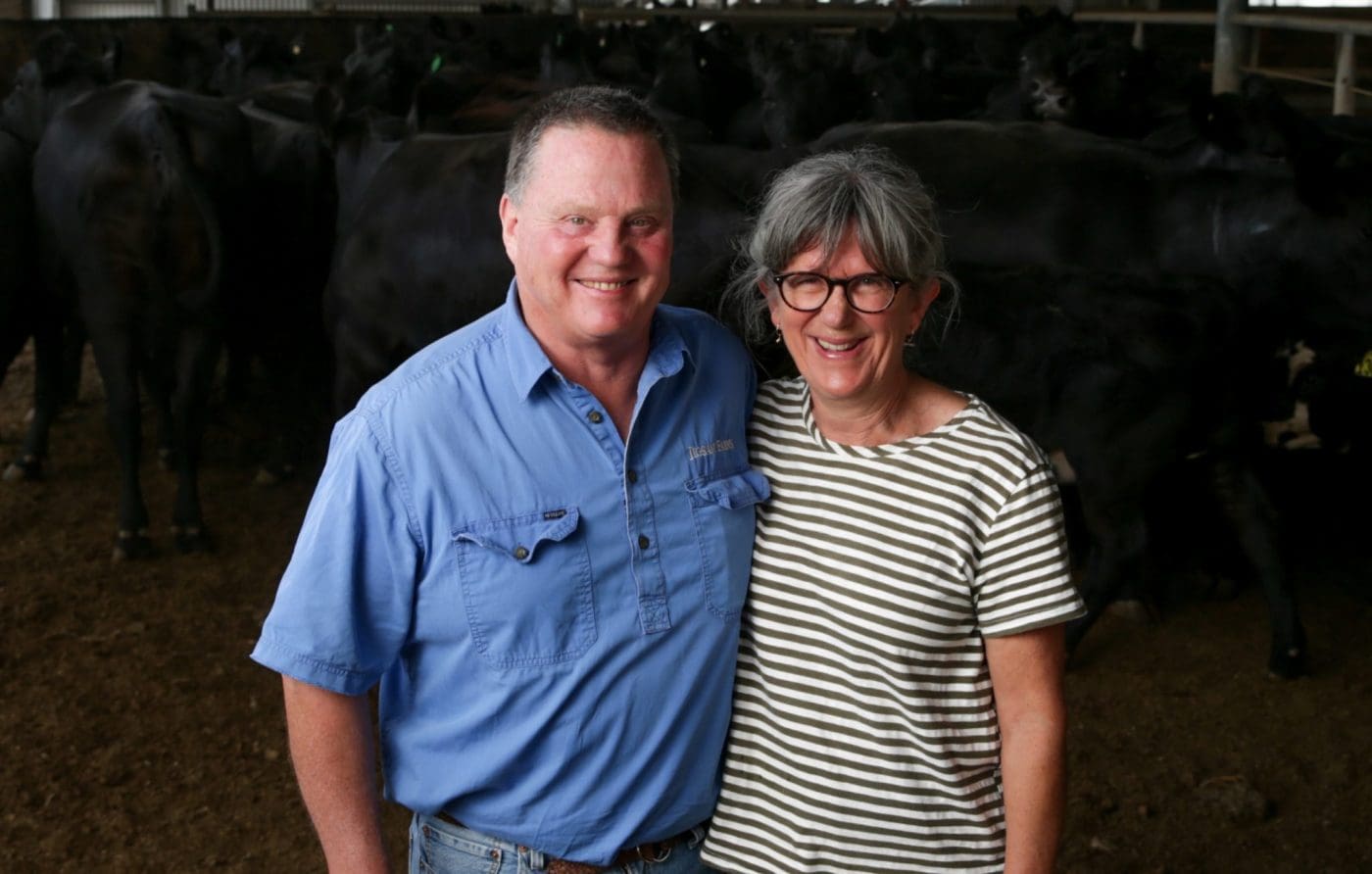Jigsaw Farms owners Mark Wootton and Eve Kantor on their property in Western Victoria. Photo – supplied Jigsaw Farms
This is part of an AgCarbon Central series of profiles on producers doing interesting environmental and carbon work. Today’s article is on Jigsaw Farms, which has been carbon neutral 2011.
WHILE Victorian-based Jigsaw Farms were one of the pioneers of carbon neutral agriculture, a new study of the operation has highlighted some challenges ahead to maintain its neutral status.
The operation near Hamilton in south-west Victoria is comprised of six properties totalling 3500ha, producing beef cattle, fine wool, prime lamb and wood.
Owners Mark Wootton and Eve Kantor say the company became carbon neutral in 2011 and has doubled its food and fibre production since 1996.
Mr Wootton said the carbon neutral status has allowed them to sell into premium markets, with a carbon neutral wool brand and selling into the Coles’ Finest beef range. He said it smoothed out fluctuations and gave them about a 20pc premium in the long-term.
“This has been achieved primarily through carbon sequestration through tree plantings which serve multiple purposes of improving water quality, biodiversity and shelter belts, as well as providing an additional income stream through plantation forests,” Mr Wootton said.
“This commitment to carbon neutrality has not compromised our productivity and profit gains. Despite 20pc of the properties being planted to trees, Jigsaw Farms runs at double the productivity of the region.”
Keeping carbon credits within the business
While Jigsaw Farms has had carbon sequestration projects set up for the past two decades, Mr Wootton and Ms Kantor have decided not to sell carbon credits on the open market.
Instead, they use carbon sequestration to offset their livestock emissions and make carbon claims on their products – a practice called insetting.
“Science based targets that businesses who purchase our products have signed up to are demanding lower carbon products,” Mr Wootton said.
“They currently pay a premium price for the suppliers who have a lower footprint than others. By insetting our carbon on farm we are more attractive to these markets. As a price-taking business, if I can open myself to more customers then I am going to take that opportunity.”
In 2022, the National Farmers’ Federation and Australian Forest Products Association took Mr Wootton to the Conference of Parties (COP) summit in Egypt. He said the demand for low carbon food and fibre was very prominent.
“My short take home from the experience is that the international rules are set in place and that as an industry we need to keep focused on operating within these markets,” he said.
“Carbon neutrality should be key driver for our research and development going forward.”
How Jigsaw became carbon neutral
Jigsaw has had a long association with well-known University of Melbourne professor Richard Eckard, who has played a major role in the development of greenhouse gas accounting for livestock operations.
Prof Eckard has completed two studies of the operation. The first in 2016 concluded that an efficient grazing operation with tree plantings could be carbon neutral, even with high stocking rates. (read the full study)
The second study, which is currently going through the peer-review and publishing process, has highlighted some challenges for the operation, which Mr Wootton said he was keen to work through.
“It has shown that we are no longer carbon neutral, although are still 85pc to 90pc there at the moment – this is due to a number of reasons,” he said.
“The first reason is that in the time between the studies the calibration has increased for methane considerably. Meaning the international science community have recognised methane as a more potent gas than first thought.
“The second reason, is that our soil carbon stores (Average 3.5pc SOC) are no longer used in the methodology because they are at capacity, can be transitional and are rainfall linked.
“Primarily it is because of the declining rates of sequestration taking place in our plantations as they mature. This declining trend will continue, be it slowly, unless we improve our feed efficiency, our genetics, plant more trees, or use a feed additive to reduce methane.”







May I direct question to Mark Wotton and Eve Kantor and Professor Eckard. After participating in this project since 2011 how robust do they think the international carbon accounting system is and do they receive carbon recognition for the many thousands of tons of carbon locked up in the red gum trees on their beautiful property?